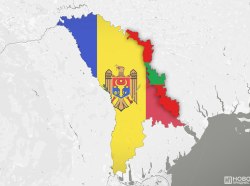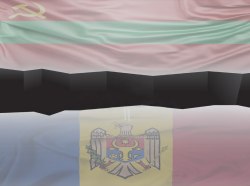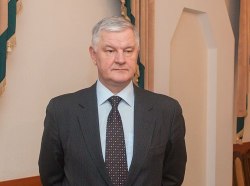The collapse of the statehood in the territory of former Ukraine has launched the process of statehood decomposition in neighbouring countries. Those who want to survive are strengthening borders with Ukraine to prevent the export of chaos. This is well exemplified by Belarus where ahead of the presidential elections nearly 200 suspicious young men resembling Euromaidan activists were refused entry to the country. The same is done by Russia, Poland, Hungary and Slovakia to protect themselves against the chaos that is swiftly spreading across Ukraine.
However, the Ukrainian collapse is strengthening the inner crisis in Moldova, which is suffering from a defective state system, which has been privatised by oligarchic groups in the past 25 years.
The conflict of interests goes hand in hand with negative economic trends in both Moldova and Ukraine. They have both lived in the past 15 years at the expense of foreign credits, against which the state property has been sold out. While selling its main assets, the state has got so weak that it cannot resist oligarchic groups. In both Kiev and Kishinev the model of the «oligarchic consensus» that is provided by a weak state and split society has been established.
However, besides Ukraine and Moldova, plunging deep into chaos, the tiniest and still non-recognised part of historical Russia — Pridnestrovie — becomes a prisoner of a situation.
The Pridnestrovian Moldavian Republic, bordering on Ukraine on one side and Moldova on the other, land-locked and with no air links with Russia, has become a prisoner of Ukrainian and Moldovan crises. And Pridnestrovie's situation is ever more difficult than that in the DPR and LPR which at least have common border with Russia/
Economic risks of Pridnestrovie
In the past two years the situation has worsened in the whole region. Both Ukrainian and Moldovan economies collapsed, which has led Pridnestrovie's tiny 500,000 market to a crisis.
The fact that the Pridnestrovian rouble was not depreciated following Ukraine's hryvna and Moldova's leu has made it possible for the society to avoid panic and depression. However, a half million market, when it is surrounded by stagnating 4-million Moldovan and 35-million Ukrainian markets, cannot but crawl into a crisis. There cannot be any self-sufficient economy with 500,000 consumers. The situation looks quite disastrous, taking into consideration Pridnestrovie's crucial dependence on imported gas and oil.
Under the present circumstances, it is evident that the economic situation in Pridnestrovie will be worsening from month to month regardless of the leaderships' capabilities. As much as the 10-million market of Belarus is crucially dependent on the 140-million Russian economy, the half-million market of Pridnestrovie crucially depends on the state of Ukrainian and Moldovan economies.
The only thing Pridnestrovie may count on is the Russian assistance and the intensive launch of its own production. Pridnestrovie should not only learn to produce, but also to sell in the domestic market as many various goods as possible — from matches and clothes to furniture and food.
Ukraine will be strengthening its blockade, and on 1 January 2016 the preferential regime for the Pridnestrovian enterprises trading with the EU will expire. Therefore, the domestic market and domestic manufacturer must become the priority for Pridnestrovie's economic policy.
Oligarchy as a factor of state destruction
However, if it were for the economy, Russian subsidies would help to solve Pridnestrovie's problems. In fact, the problem lies much deeper and becomes discernible at a political economic level.
The reason for the break-up of Ukraine's and Moldova's statehood is the oligarchic model of economy. The state was losing sectors of the economy during the privatisation, which gave rise to oligarchic groups. The banking sector, capital development, road building, metallurgy, chemical and agricultural production became the base for billion-worth private capitals that at stage two went in for politics and began to privatise the parliament, government and governmental agencies.
Any revolt, coloured revolution or a maidan is a multicomponent process. It comprises the three political factors — people's protest, external support from the USA and the loyalty of the local oligarchy. The third element is crucially important as any maidan results in power transfer to the oligarchy. Big private capital is an ally of the state in whose banks private means are stored.
If Pridnestrovie had the Belarusan model of economy where the state is a key player, it would be relatively safe. However, the Pridnestrovie's economy as well as Moldova's and Ukraine's has been monopolised by private capital. The financial and industrial group Sheriff managed to accumulate excess capital and control various assets from FC Sheriff to the brandy distillery Kvint, gas stations and retail outlets. The enterprises of the private corporation Sheriff provide nearly 50% of budget revenues, which means, in fact, that the state of Pridnestrovie is a prisoner of private capital. And in a natural course of events this capital will strive to privatise state authority bodies. It does not mean that the corporation is good or bad. Oligarchies are alike in any part of the world. This is why Pridnestrovie's private capital will act in the same way as did its Ukrainian and Moldovan counterparts.
Hence, the second key threat for Pridnestrovie's statehood is the privatisation of the state by the oligarchy. And as was exemplified by Ukraine, Moldova and Georgia, the process of privatisation always starts from the parliament. The rest authority bodies will be divided by private capital later. If you want to learn to what extent the oligarchy is influential in your region, you should study the composition of your parliament.
US party in the region
The third factor, threatening the most distant and non-recognised region of the Great Russia is a political part the USA is playing against Russia in the Black Sea region
Odessa and Odessa district are under direct control of the USA in person of the governor, Mikhail Saakashvili, who strengthened the blockade of the PMR soon after the appointment. Now Saakashvili has managed to have his 26-year-old associate appointed head of the Odessa customs. This suggests Saakashvili will be able to manually control the trade blockade.
Let us not forget the plans for joint Moldo-Ukrainian control over the Pridnestrovian border. As the internal political crisis is subsiding in Moldova, Kishinev and Kiev will resume this idea.
The USA requires a crisis in Pridnestrovie to weaken Russia, which cannot provide equal support to the DPR, LPR and Syria. Every new front makes the Kremlin defocus its attention and results in new budget expenses. Besides, involving Russia in a new conflict is a good pretext for new sanctions and trade restrictions.
Therefore, the transfer of power to Saakashvili in Odessa is more than just a part in the Ukrainian crisis. This is a claim for the total blockade of Pridnestrovie. In the west the USA allies with Romania, which almost manually controls Kishinev's governing elites. Bucuresti, however, is not ready for escalation and military actions as its final goal is to absorb all Moldova with Pridnestrovie. Romania should play the role of a «good detective», whereas the role of a «bad one» is reserved for Ukraine.
Republic at stake
Today Pridnestrovie is facing the crisis that is likely to outgrow the crisis during which the republic was borne. In the early 1990s there was still a common contour of the Soviet Union economy: both Ukraine and Moldova and Pridnestrovie had developed industries. Over 25 years of industrial degradation the industry has been either privatised or absorbed by private capital or destroyed.
And the destruction of a sovereign economy has inevitably led to a political and cultural colonisation. Moldova underwent total Romanisation; in Ukraine there have been constant attempts in the past 25 years to eradicate Russian language and literature. The oligarchic power always provokes a nationalistic shift in the society as this society is easy to rule. A set of nationalism, russophobia and destruction of the state is for sale.
As a design the technology of state destruction looks as follows: The economic crisis — growth of people's discontent — heating the protest — riot — change of power. And it is at the stage of change of power when protest leaders are replaced by oligarchic proteges. One can say we deal with a hybrid war when the state is not eliminated by military power, but by economic blockade and the subsequent inner political crisis.
Now Pridnestrovie is facing its moment of truth as the very model of a non-recognised part of Russia, a splinter of the USSR, where the unique Soviet, Russian, Moldovan and Ukrainian identities, based on internationalism, peoples' friendship and respect for labour, have been preserved, is at stake
The issue of survival and preservation of Pridnestrovie is not only the republic's task. This is the task for Russia itself, which will either retain its presence in Pridnestrovie or will lose its positions in the Dniester region, ultimately losing Moldova, Odessa, Bessarabia and Gagauzia. And if for Russia it is just one more crucial trial, which may result in additional expenses and international problems, for every citizen of Pridnestrovie it is a matter of survival. Today the PMR is the only thing that is keeping Russia at the boundaries conquered by Suvorov and Potemkin.








